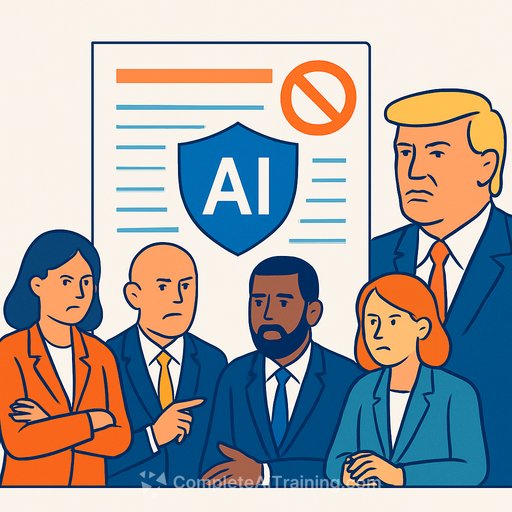AI in insurance: progress, not hype
Cary, NC - Sept 18, 2025
A new Economist Impact report, sponsored by SAS, says AI is finally delivering practical gains in insurance. Generative and agentic AI are improving productivity across underwriting, claims, product design and risk, but the shift is steady rather than overnight.
Leaders expect hybrid teams where human employees work alongside AI agents. As one executive put it, "Insurers' workforces will become hybrids of human employees and agents collaborating closely, with some agents working largely independently under human oversight."
What the research covers
Underwriting the Future: The role of artificial intelligence in insurance draws on executive roundtables and interviews. It builds on a February survey of 500+ leaders in 17 countries. Insights include perspectives from Zurich North America, HDI Global, Tokio Marine and Manulife.
Key takeaways for insurers
- Incremental gains so far. AI has long supported underwriting and fraud detection. Recent GenAI pilots are speeding coding work by 30-50%, improving customer service, and enabling real-time analysis of cyber and climate risk. Adoption is uneven: insurtechs (especially in cyber) are ahead; legacy-heavy firms move slower and focus on narrow use cases.
- Productivity ≠ instant cost savings. Many carriers reinvest time savings into new tools and handling higher claim volumes. Jobs aren't simply cut; teams are reskilled for human-advantaged tasks like sales and complex negotiations. Agentic AI platforms help firms adapt faster and avoid monolithic, slow-moving projects.
- AI is becoming table stakes. Competitive pressure is pushing insurers to adopt AI even if short-term ROI is mixed.
Agility is now a requirement
Technology, governance and rules are in flux, and regulations vary widely by market. Global insurers need adaptable processes, strong model governance and clear change management. For context on regulatory direction in one region, see the EU's Artificial Intelligence Act overview from the European Commission.
Where AI agents fit today
"The greatest value for AI agents is in repetitive and data-intensive tasks, especially when orchestrated with other AI agents," notes Thorsten Hein, Principal Global Insurance Advisor at SAS. More elaborate tasks - such as complex risk modeling - still need specialized tools and human expertise.
Data quality remains the foundation. To get full value, insurers must make high-quality data available and combine it quickly with other relevant internal and external sources.
What leaders are doing next
Executives are piloting targeted use cases and scaling what works. "AI - particularly agentic AI - has the potential to perform many tasks either independently or with human oversight," says Franklin Manchester, Principal Global Insurance Advisor at SAS. The goal: faster service, lower operating costs and employees focused on higher-value work.
Practical moves for carriers
- Start narrow, scale fast. Pilot AI agents in underwriting triage, FNOL intake, fraud triage, subrogation and coding assistance. Measure cycle time, leakage and loss adjustment expenses.
- Build an agentic architecture. Orchestrate multiple agents with clear guardrails, approval thresholds and audit trails. Keep a human in the loop for high-severity decisions.
- Fix data plumbing. Modernize ingestion, unify reference data, and track lineage. Prioritize external data that improves pricing and risk signals (e.g., cyber telemetry, climate data).
- Upskill teams. Train underwriters, adjusters and product owners to supervise models, review outputs and handle exceptions. Move talent to work AI can't do well: relationships, complex negotiations and judgment-heavy assessments.
- Tighten governance. Define model risk tiers, testing standards, and documentation. Map controls to local rules and corporate policies; expect variation by jurisdiction.
- Reinvest savings. Use productivity gains to improve customer experience, expand straight-through processing and handle surge events without adding headcount.
Report source and further reading
For more on the findings, visit Economist Impact.
Skill up your teams
If you're building practical AI capability by job role, explore curated training options.
About Economist Impact
Economist Impact combines the rigour of a think-tank with the creativity of a media brand to engage a globally influential audience. We believe that evidence-based insights can open debate, broaden perspectives and catalyse progress. The services offered by Economist Impact previously existed within The Economist Group as separate entities, including EIU Thought Leadership, EIU Public Policy, Economist Events, El Studios and SignalNoise. Our track record spans 75 years across 205 countries. Along with creative storytelling, events expertise, design-thinking solutions and market-leading media products, we produce framework design, benchmarking, economic and social impact analysis, forecasting and scenario modelling, making Economist Impact's offering unique in the marketplace. Visit www.economistimpact.com for more information.
Acerca de SAS
SAS es líder mundial en datos e IA. Con el software de SAS y las soluciones específicas del sector, las organizaciones transforman los datos en decisiones fiables. SAS brinda THE POWER TO KNOW ®.
Your membership also unlocks:






